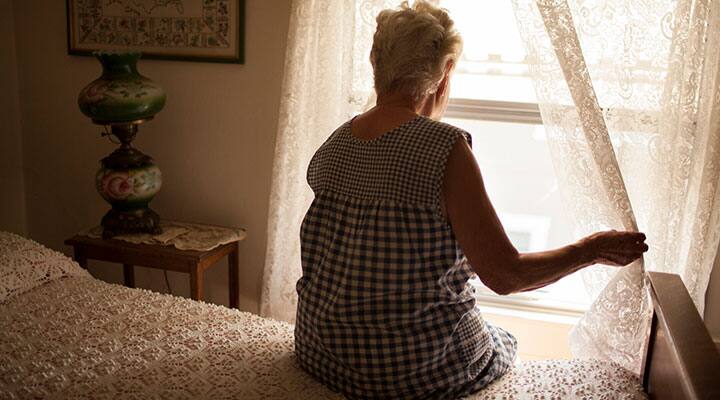
Good Neighbors, Better Life Expectancy?
Good Neighbors, Better Life Expectancy?
"Love thy neighbor" takes on a whole new meaning when it comes to life expectancy! The importance of maintaining close relationships with your neighbors may just be the key to a healthy life span, according to a recent study from Rutgers University published in Social Science and Medicine.
Researchers studied the death rates of older Chinese Americans who lived alone (a status that has been linked to reduced life expectancy in multiple studies) and found that strong neighborhood connections and social relationships reduced the negative impact of living alone, and even contributed to longevity.
Using data from the Population Study of Chinese Elderly in Chicago, which included the living situation (whether they lived alone or with others) and mortality rates of 3,100 adults aged 60 and older over a 10 year period, researchers found that those who lived alone and reported low interactions and social connections with their neighbors had a 48.5% increased risk of death. Conversely, community dwelling individuals who lived alone but had higher interactions with their neighbors did not have as nearly high of a mortality risk, with no statistically significant differences in all-cause mortality compared to those who lived with others.
The authors of the study stressed the need for community interaction and other social programs to offer additional resources to those that who don't have a support system in their neighborhoods or communities. "Enhancing neighborhood cohesion may be a promising way to reduce early death for adults who live alone," stated lead author of the study Yanping Jiang.
How a lack of social interaction can affect your health
While social interaction isn't the only thing in your life you should be focusing on, it turns out that it does play a bigger role in your health than you may think—impacting the elderly that live alone the most. In the United States, it's estimated that about 27% of people over the age of 60 live alone. And unfortunately, this kind of social isolation has been associated with countless poor health outcomes, including:
Depression
Dementia / cognitive decline
Poor biological health
Premature death
According to the CDC, those who live alone and have poor social relationships also have a 29% increased risk of heart disease and a 32% increased risk of stroke. A lack of social interactions can also contribute to higher stress, coinciding with higher rates of depression, anxiety and even suicide.
The Rutgers study confirmed these negative outcomes, finding an absence of social support to be one of the highest indicators of premature death. The researchers also determined that those who lived alone with the highest risk of mortality were more likely to be female, have a lower level of education but a higher level of income, and more chronic health conditions compared to those who did not live alone.
Think this only impacts the U.S.? Think again. There is a universal need to for face-to-face interaction to support overall health and longevity. The Copenhagen Male Study looked at the impacts of living alone along with behavioral, psychosocial and environmental risk factors. About 3,300 men at an average age 62.9 years old were followed over a period of 32 years. Over the study and follow up period 89.4% of the population died, with an overwhelming 38.9% dying of cardiovascular causes. The predictor of mortality for those living alone was a whopping 9.6%!
The research is clear—living alone is an independent risk factor for all-cause and cardiovascular mortality, with individuals in middle and lower socioeconomic positions being at particular risk for mortality.
Does being social make you live longer?
Social relationships have been found to positively support health in a variety of ways:
- Improved mood and mental health
- Lower risk for cognitive decline while promoting optimal attention span and memory
- May contribute to healthy longevity
- Can help with self-esteem
Beyond that, another study found that social integration is related to better physiological functioning and lower risks of physical disorders across the lifespan, and that social connections protect health and promote longevity. Additionally, a large meta-analytic review which studied 300,000 participants affirmed the positive impacts of being social and its impact on mortality, too, finding that those with stronger social relationships had favorable outcomes, with a 50% increased likelihood of survival. This was consistent across age, sex and health status.
It should come to no surprise, then, that Okinawans, inhabitants of one of the Blue Zones (places in the world that have some of the world's longest-living people) have prioritized long term social relationships from early-life and maintained that mentality into their late-life.
So, while being social isn't the sole factor in helping you live longer, it is associated with a wealth of benefits that are hard to ignore. And while you don't have to be a total social butterfly to stack the longevity odds in your favor, these findings are a call to action for those who don't have a large support system in their communities to foster more meaningful relationships.
5 ways to increase community interactions
Especially over the last few years, social isolation has become alarmingly more common. Regardless of whether you live alone, having people to see and places to go is an essential part of living longer—and living well. Social interactions—be them as simple as checking your P.O. box, or striking up a conversation with the grocery store clerk—keep the proverbial wolf of loneliness off the doorstep. Christopher McCandless had it right when he proclaimed, "Happiness is only real when shared."
Fortunately, there are multiple ways you can increase your own community interactions to ensure that you are prioritizing the social ties to those around you:
Join a club
—With the emergence of apps like Meetup, it's become simpler than ever to seek out like-minded people to participate in clubs that involve common interests. Prolific chess player? There's a club for that. Maybe you want to find your next favorite read? There's a club for that, too. The possibilities are endless. If an app isn't your style, your local library can provide a wealth of resources to help you seek out exactly what you're looking for.Join a sports team
—Remember that sport you used to love? It might be time to get back in the saddle (perhaps even literally!) and join a sports team. This can give you the opportunity to participate in community events and foster a sense of belonging by spending time with others. And, developing a regular fitness routine isn't a bad idea for longevity.Pro-tip: Not someone who plays sports, but still want to prioritize physical fitness? Try an all-levels group fitness class!
Plan regular get-togethers with the people in your community
—Planning inclusive events with the people around you is another way to support healthy relationships within your community. Try to organize a low stakes game night or themed potlucks on occasion. And take advantage of seasonal or holiday related events, like pumpkin carving in the fall or Galentine's Day, to bring people together in fun and interesting ways. If you want more structure and live in a senior living community, keep an eye out for posted events to get to know your neighbors and peers.Participate in local events
—Don't forget to think local to get social! Check your city or county's government website to be the first to know when there are local events happening in your community. Also keep an eye out for recurring events like farmer's markets or events in your nearby park. The library and Y are also local spots to find social events.Volunteer
—Helping others in need is a rewarding way of fostering social relationships and doing some good in the process! No matter where you live, there is always someone or something in need. Try to find a soup kitchen nearby where you can help serve food, or donate your time to an animal shelter.
How to prioritize happiness in your life
Throughout our lives, we're all susceptible to the "blues;" into every life some rain must fall, and that can take the form of occasional sadness. But there are things we can do that can help us keep loneliness at bay. This is important, because maintaining optimism is something the longest-living populations have in common. Just as living alone and without social interaction is associated with a shorter lifespan, a positive outlook is considered a major factor in longevity.
Follow these tips and tricks to keep your chin up:
Maintain a healthy lifestyle
—These healthy habits are essential for your health and well-being.- Balanced diet—Of course, it's no secret that a healthy diet offers whole-body benefits. But did you know that one of them is an upbeat mood? This is because the mind-gut connection runs deep. Certain foods and nutrients, like probiotics, are particularly supportive.
- Get adequate sleep—Sleep is one of the single most important things you can do to support your health. Lack of sleep impacts your energy, appetite, productivity levels, level of physical activity, stress, and even your social life, making adequate sleep an essential for happy and healthy living. Try to aim for 7-9 hours of quality sleep each night.
- Exercise—Whether it's a brisk walk or heavy lifting, moving your body and incorporating exercise is important if you're focusing on healthy aging. Those workouts do wonders for your mental health. Exercise is well known for helping improve your mood by releasing endorphins and other chemicals in your brain—leading to a more positive mindset.
Connect with loved ones, both near and far
—Prioritize social connections. While it's important to stay connected to people within close physical proximity, it's also rewarding to reach out to the people you love and care about.Manage your stress
—Stress is a major negative factor that, unchecked, can contribute to other mental and physical health concerns. Make time for self-care by meditating, reading a book, or ease your anxieties by talking to someone. Look to your social networks as a means of support when you're feeling anxious or overwhelmed by things going on in your life.
References
- Cohut, Maria, Ph.D. "What are the health benefits of being social?" MedicalNewsToday. February 2018. https://www.medicalnewstoday.com/articles/321019
- Holt-Lunstad, Julianne, et al. "Social Relationships and Mortality Risk: A Meta-analytic Review." PLOS Medicine. July 2010. https://journals.plos.org/plosmedicine/article?id=10.1371/journal.pmed.1000316
- Jiang, Yanping, et al. "Living alone and all-cause mortality in community-dwelling older adults: The moderating role of perceived neighborhood cohesion." Social Science & Medicine. January 2023. https://www.sciencedirect.com/science/article/abs/pii/S0277953622008747
- Jensen, Magnus T, et al. "Living alone is associated with all-cause and cardiovascular mortality: 32 years of follow-up in the Copenhagen Male Study." European Heart Journal-Quality of Care and Clinical Outcomes. July 2019. https://academic.oup.com/ehjqcco/article/5/3/208/5300001
- Vila, Jaime. "Social Support and Longevity: Meta-Analysis-Based Evidence and Psychobiological Mechanisms. Frontiers in Psychology. September 2021. https://www.frontiersin.org/articles/10.3389/fpsyg.2021.717164/full
- Yang, Yang Claire, et al. "Social relationships and physiological determinants of longevity across the human life span." Proc Natl Acad Sci USA. January 2016. https://www.ncbi.nlm.nih.gov/pmc/articles/PMC4725506/
- "Loneliness and Social Isolation Linked to Serious Health Conditions." Centers for Disease Control and Prevention. https://www.cdc.gov/aging/publications/features/lonely-older-adults.html
- "Strong connection to neighbors may improve health outcomes." ScienceDaily. December 2022. https://www.sciencedaily.com/releases/2022/12/221213121441.htm
About Our Story Sources
The Life Extension Health News team delivers accurate information about vitamins, nutrition and aging. Our stories rely on multiple, authoritative sources and experts. We keep our content accurate and trustworthy, by submitting it to a medical reviewer.



